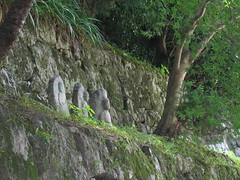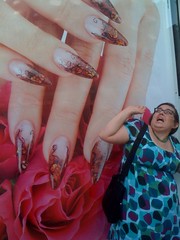 I've always loved this teaching... excerpted from Pema Chödrön's When Things Fall Apart. I won't put it in blockquotes cuz there's so much... blockquote it in your mind ;) .
I've always loved this teaching... excerpted from Pema Chödrön's When Things Fall Apart. I won't put it in blockquotes cuz there's so much... blockquote it in your mind ;) . The idea of "giving up hope" is weird to us... think of it as giving up aggression toward yourself... well, see how she defines it. I interpret hope as a sort of tension, being at odds with reality, harboring aggression toward oneself and toward life; hopelessness means relaxing, accepting oneself, seeing what's really happening and being present to it so that one can respond calmly and intelligently. I wouldn't call it hopelessness but I get what she means.
I excised so much in the hope that it would be short enough to be read, that it may seem a little jerky; you can read the whole thing here or here. Also, I didn't always use ellipses or brackets because they seem distracting... again, read the real thing at these links.
-=-=-=-=-=-=-=-=-=-=-=-=-
 "[C]ompletely giving up hope... is the beginning of the beginning. Without giving up hope that there is somewhere better to be, that there is someone better to be, we will never relax with where we are or who we are.
"[C]ompletely giving up hope... is the beginning of the beginning. Without giving up hope that there is somewhere better to be, that there is someone better to be, we will never relax with where we are or who we are."We long to have some reliable, comfortable ground under our feet, but we’ve tried a thousand ways to hide and a thousand ways to tie up all the loose ends, and the ground just keeps moving under us.
"The difference between theism and non-theism is not whether one does or does not believe in God... Theism is a deep-seated conviction that there is some hand to hold: if we just do the right things, someone will appreciate us and take care of us... Non-theism is relaxing with the ambiguity and uncertainty of the present moment.
"The first noble truth of the Buddha is that when we feel suffering, it doesn’t mean that something is wrong. Suffering is part of life, and we don’t have to feel it is happening because we personally made the wrong move.
 "Hope and fear is a feeling with two sides. As long as there is one, there is always the other. In the world of hope and fear, we always have to change the channel, change the temperature, change the music, because something is getting uneasy, something is getting restless, something is beginning to hurt, and we keep looking for alternatives.
"Hope and fear is a feeling with two sides. As long as there is one, there is always the other. In the world of hope and fear, we always have to change the channel, change the temperature, change the music, because something is getting uneasy, something is getting restless, something is beginning to hurt, and we keep looking for alternatives."Hope and fear come from feeling that we lack something; they come from a sense of poverty. We can’t simply relax with ourselves. We hold on to hope, and hope robs us of the present moment.
"[Instead,] we can drop the fundamental hope that there is a better "me" who one day will emerge. We [can] renounce the tenacious hope that we could be saved from being who we are.
"Giving up hope is encouragement to stick with yourself, to make friends with yourself, to not run away from yourself, to return to the bare bones, no matter what is going on.
 "If we totally experience hopelessness, giving up all hope of alternatives to the present moment, we can have a joyful relationship with our lives, an honest, direct relationship, one that no longer ignores reality."
"If we totally experience hopelessness, giving up all hope of alternatives to the present moment, we can have a joyful relationship with our lives, an honest, direct relationship, one that no longer ignores reality."-=-=-=-=-=-=-=-=-=-=-=-=-
Where does meditation come into this? Meditation is simply (and difficult-ly) the practice of continually letting go of hope and fear and relaxing into the present moment...
That doesn't make me any less nervous as I try to get ready to go on my meditation retreat... which I still might panic and back out of...
On a lighter note, last night I had this whole complicated dream about looking for cookies with Loopy... there were many adventures on the road to cookies, and then the cookies were misplaced, and we got separated, and then I found the cookies, and then I was told not to eat those, that my cookies were somewhere else......... I don't know how to interpret this dream except to say that I like cookies.
1 comment:
I get the jist, but the excerpted article is semantically weird for me since I come out of another tradition.
The idea, though, is sound, and I'd say it this way:
The ego has expectations. Let go of the ego, and see what really is. One can never possess safety, comfort, or wealth. These things are transient and come and go. We have no guarantees. We don't even know that we will draw our next breath. There is nothing permanent in the world of change; expectations only cause us stress and fear.
In other words, be here now.
What I disliked about her choice of "hopelessness" is that as an English speaker I have a lot invested in the word hope, and hopelessness is a negative word, one speaking of poverty, emptiness, lack... letting go is not a state of lack: it is a state of effulgence. Fullness. Completion. Union with the Self.
But still, I grok the message and yea verily it is Good.
"Don't eat those cookies! Those cookies belong to someone else!" LOL!
Post a Comment